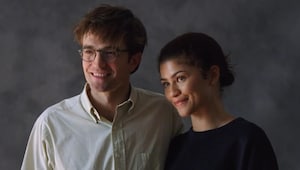Sad endings, big feelings—why we can’t stop watching tragic love stories that break our hearts
Cue in the tissues.

When it comes to movies and shows, I almost never reach for a rom-com. They’re fun every once in a while, sure, but I’m a complete horror-thriller girlie at heart. Give me jumpscares, the kind of silence that makes your skin prickle, and that edge-of-your-seat tension any day. But every once in a while, I’ll indulge in a heartbreaking, gut-wrenching romance (not rom-com) with a tragic ending, just to feel that rush of emotion. It’s not about needing a good cry; it’s not even about the tragedy itself. It’s the way these stories capture love at its rawest—pure, unconditional, unforgettable—that makes their story so memorable, despite the heartbreak.
Take Me Before You. One of my all-time favourite films, I’ve rewatched it more than ten times, even though I know exactly how it ends. Spoiler alert: Will’s death is one of the most devastating scenes I’ve ever sat through (second only to Marley & Me), yet I keep going back for the slow-burn tenderness, the fleeting joy, and that final, impossible moment when Will asks Lou to stay with him as he takes his last breath (by choice). They bring a kind of heartache that feels both painful and beautiful all at once.
Think of Titanic. Now I'll be the first to admit that the shipwreck is a tragedy that makes me ugly cry. The mother singing her kids to sleep as the floor begins to flood, the couple who hug each other tight in bed, preparing for the worst to come, and the dogs! They don't show it, but just the knowledge that the pets didn't survive the 1912 sinking is enough to make me bawl. But when it comes to the film, Jack and Rose's love story is not memorable because of the shipwreck (not directly anyway). It's because it was a fleeting romance that burned bright and fast. Jack never grows old. Their story never gets weighed down by daily life or mundane frustrations (just imagine Revolutionary Road as the continuation of their story in a different universe). His death froze their love in time, making it eternal, almost myth-like.
Aashiqui 2 did the same. Rahul’s decision to end his life left Aarohi with love and loss sewn into her forever. Yes, it broke us. But it also made their love untouchable. Imagine if he’d gone to rehab, gotten sober, and they lived happily ever after—it's sweet, sure, but forgettable. Instead, his death and her heartbreak are what immortalised their love story.
That is the paradox of tragedy: the heartbreak at the end is what makes the story memorable and eternal.
The beauty in heartbreak
Part of what keeps us coming back to romantic tragedies is the way they portray devotion in the face of inevitable loss. A Walk to Remember is perhaps the best example of this. While it starts off like any other teenage love story, with awkward silences, hesitant conversations, and a male protagonist who's too cool to fall for the quiet nerd, the movie takes an unexpected detour, especially for those who didn't read the book. When we learn about Jamie’s illness, we see how Landon responds. He does not pull away. He leans in, all in, and lets her love transform him completely. Their romance becomes all about hope, faith, and squeezing the most out of every borrowed moment, proving that even short-lived love can change someone forever.
Similarly, October swapped the declarations and dramatic confessions for Dan’s quiet, unwavering presence by Shiuli’s side. A love story, almost entirely one-sided, yet achingly tender, showing that sometimes love is simply in the staying. Even when there’s no promise of what comes next.
Why do we keep going back?
Maybe it’s nostalgia. Maybe we secretly love that gut-punch of emotion. Or maybe it’s because tragic romances show how intense love can be, even if it doesn’t last. On the surface, it might not make sense. Why sign up for heartbreak on repeat? But that’s the paradox of tragic romances. They give us a way to feel grief and loss safely, a chance to experience the intensity of love and its fragility without real-world consequences. They remind us how fleeting life can be, and how deep connection can leave a mark that lasts long after it ends.
Lead image: IMDb
Also read: Rainy day in? Press play on these feel-good, moody, and binge-worthy picks
Also read: 10 summer movies that totally get your ‘messy girl era’
more from Life

Sip, flirt, repeat: Inside New Delhi’s most discreetly delicious cocktail bar

Is 'Bridgerton' season 4 saving its juiciest drama for Part 2?

The rise of ‘I want it all’ culture and why Gen Z means it differently

NAAR and Quintonil: Bringing a taste of Mexico to the Himalayas

This Worli café is all about comfort, caffeine, and slow sips

Elie Saab brings couture-inspired luxury residences to India

Not a drill: the plot of the third 'Game Changers' book about Ilya and Shane just dropped!

What we know about 'The Drama', the Zendaya–Robert Pattinson film that’s keeping its cards close

Sorry, not sorry—over-apologising is holding you back and here’s how to fix it

The 75 hotter fitness challenge proves you don’t need burnout to build better habits
